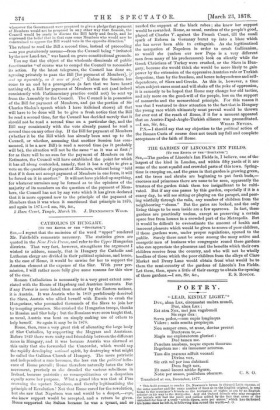CATHOLICS IN HUNGARY.
[To THE EDITOR OF THE "SPECTATOR."] regret that the omission of the word "upper" rendered Mr. Fairfield's comments necessary. The statistics given are quoted in the Nate Freie Presse, and refer to the Upper Hungarian districts. That very fact, however, strengthens the argument I wished to adduce, namely, that in Hungary the Catholic and Lutheran clergy are divided in their political opinions, and hence, in the case of Rome, it would be unwise for her to support the Austrian element at the expense of the Slay. With your per- mission, I will rather more fully give some reasons for this view of the case.
Roman Catholicism is necessarily to a very great extent asso- ciated with the House of Hapsburg and Austrian interests. But if any Power is more hated than another by the Eastern nations, it is Austria. It was Austria who in 1849 perfidiously deceived the Slays, Austria who allied herself with Russia to crush the Hungarians, who persuaded thousands of the Slays to join her by tempting promises. She crushed the Hungarian troops, thanks to Russian and Slav help ; but the Russians were soon taught that, as usual, Austria was bent on simply making use of others to help herself. So again it may be in 1878.
Rome, then, runs a very great risk of alienating the large body of Slav Catholics, by supporting the Magyars and Austrians. Before 1849 there were unity and friendship between the different races in Hungary, and it was because Austria was alarmed at this unity that she forwarded the Concordat, which would sap the rapidly developing national spirit, by destroying what might be called the Gallican Church of Hungary. The more patriotic and independent a race becomes, the less can the political influ- ence of Rome prevail ; Rome therefore naturally bates the Slav movement, precisely as she dreaded the various rebellions in Ireland, because patriotic ; so cosmopolitanism or a despotism equally serve her purpose. What a grand idea was that of Pius crowning the upstart Napoleon, and thereby legitimatising the principle of Revolution ! Not that Rome cared for the revolution, but she saw that Napoleon was and would be a despot,---ergo, she knew support would be accepted, and a return be given. Rome supported the Sultan because he was a tyrant, and so
needed the support of the black robes ; she knew her support would be rewarded. Rome, as usual, careless of the people's good, played off Charles V. against the French Court, till the small spark of Reform in Germany burnt up into a blaze which she has never been able to extinguish. As she legitimatised the usurpation of Napoleon in order to crush Gallicanism,. so would she (unless our new Pope is a very different man from many of his predecessors) look on silently while the Greek Christians of Turkey were crushed, or the Slays in Hun- gary, because she would think she would be more likely to gain power by the extension of the oppressive Austrian rule or Turkish• despotism, than by the freedom, and hence independence and self- dependence, of Slays and Greeks. As this is, however, a time when subject-races must and will shake off the yoke of oppression, it is earnestly to be hoped that Rome may change her old tactics, and rely more on the good-will of the people, leas on the support of monarchs and the monarchical principle. For this reason it was that I ventured to draw attention to the fact that in Hungary the young race which ultimately must prevail would be thrown for ever out of the reach of Rome, if it for a moment appeared that an Austro-Papal-Anglo-Turkish alliance was premeditated.
—I am, Sir, &c., Wn.Lis NEVL.N7S. P.S.—I should say that my objection to the political action of the Roman Curia of course does not touch my full and complete• acceptance of the faith of Rome.


































 Previous page
Previous page